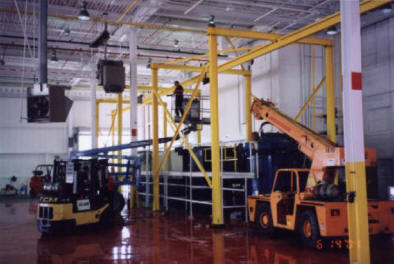Heavy Equipment Manufacturers About
Source: (Google,com.pk)













Source: (Google,com.pk)
Industrial equipment companies that have survived the recent economic turbulence are transforming their traditional heavy equipment into lower-cost products with more sophisticated capacity. The new equipment they are producing for industrial customers is capable of generating reams of operational data, which, in turn, has created a lucrative new income stream based upon services.
In a four-year study of 32 major industrial equipment companies, Accenture found that the leading firms used innovation to reposition themselves from being product manufacturers to solution providers. Many of the manufacturers became more innovative because of customers' demands for goods and services that dramatically increase productivity. As a result, industrial equipment manufacturers are creating smart products, using the Internet to improve processes, adding services and shifting from asset-intensive manufacturers to knowledge-based businesses.
The leading industrial equipment manufacturers have developed smart products designed to increase their customers' productivity and capture valuable data, which is fed directly back into their own research and development functions. IT-enabled products interact across open platforms and provide new solutions that, in some cases, can be more valuable to the customer than the product itself. For instance, sensors are being placed on motors and other key components of industrial equipment to allow manufacturers and operators to continually monitor whether the product needs servicing or repair. GE Engine Service uses in-flight data acquisition and communications to diagnose and predict operational interruptions. The result is a reduction in operational interruptions by avoiding major engine performance and maintenance issues and an improvement in troubleshooting efficiency and speed.
Smart products take a considerable research and development commitment from a manufacturer, but can generate significant benefits. ABB, which stands out in this area, allocates more than 8 percent of its revenue and 20 percent of its corporate resources to exploration and experimentation. The leaders in the survey of 32 companies generate 70 percent of their revenue from products designed within the past five years. These products provide service and support revenue opportunities like never before, leveraging product usage and customer intelligence information.
The Internet platform has provided a great port for manufacturers, distributors and customers to access and share information derived from the smart product technology embedded into industrial equipment. It is no longer necessary for major investments in infrastructure to distribute and retrieve the information -- a Web browser will do.
The industry leaders who have successfully repositioned themselves as solution providers realized early on the importance of branching out from their asset-intensive roots. They no longer have to spend so much additional capital to offer an increased product line but instead focus on services they can provide as part of their product purchase. The move has paid off for global industrial giant Atlas Copco, which gained entry into the services industry in the United States after making several strategic investments. By 1999, 21 percent of the firm's revenue was generated from its service business. Selling services rather than products can allow companies to build new revenue that can fuel the new product pipeline.
Heavy Equipment Manufacturers
Heavy Equipment Manufacturers

Heavy Equipment Manufacturers

Heavy Equipment Manufacturers

Heavy Equipment Manufacturers

Heavy Equipment Manufacturers

Heavy Equipment Manufacturers

Heavy Equipment Manufacturers

Heavy Equipment Manufacturers

Heavy Equipment Manufacturers

Heavy Equipment Manufacturers

Heavy Equipment Manufacturers

Heavy Equipment Manufacturers

Heavy Equipment Manufacturers

Heavy Equipment Manufacturers

No comments:
Post a Comment